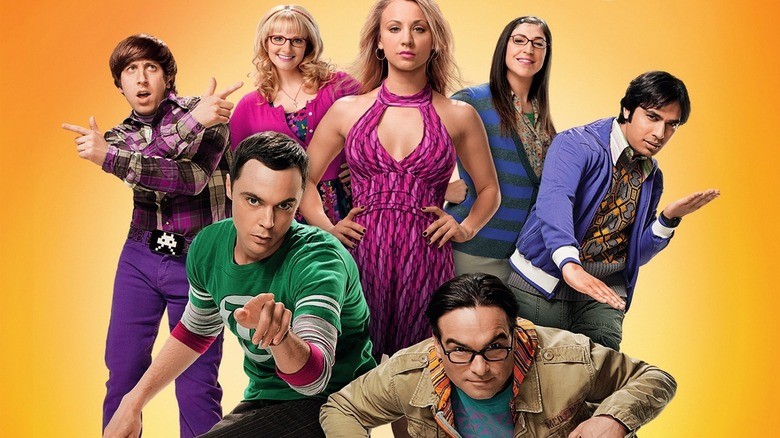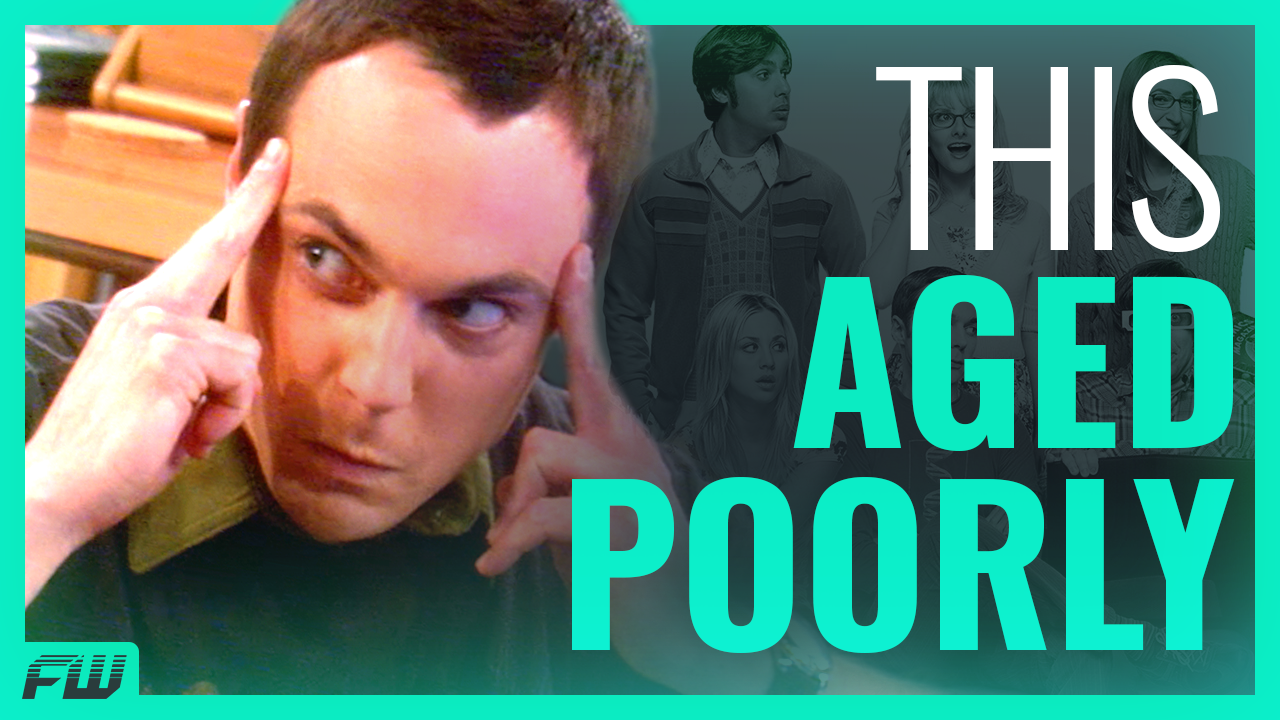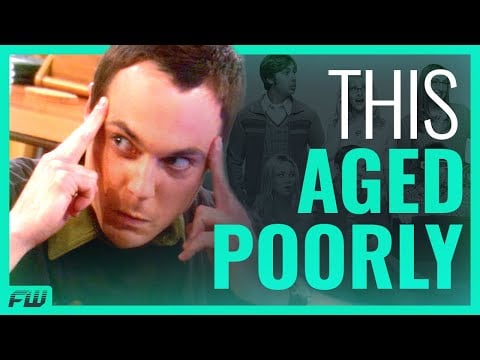In this FandomWire Video Essay, we explore why The Big Bang Theory is worse than you remember.
Check out the video below:
Subscribe & hit the Notification Bell so you never miss a video!
The Big Bang Theory Didn’t Age Well…

The Big Bang Theory is a fascinating modern-day phenomenon. The show ran for 12 seasons, ending in 2019 with a total of 279 episodes broadcast. It was nominated for a whopping total of 46 Emmy awards, winning 7. Jim Parsons alone has collected both the Emmy Award for Outstanding Lead Actor in a Comedy Series and a Golden Globe for Best Actor in a Television Comedy Series for his portrayal of the insufferably awkward Sheldon Cooper. Parsons, along with his co-stars Johnny Galecki and Kaley Cuoco reportedly each earned 1 million dollars per episode for the last 5 seasons of the show, with season 11 topping the US ratings charts several weeks in a row.
However, in the years since the series’ final episode, its reputation has significantly staggered and wavered with mainstream audiences. The show still has its fans, of course, but more and more people seem to be vocally expressing their disdain for the series through social media and online forums. The standards of comedy tend to sway over time, with sitcoms like All In The Family, being a strong example of writing that would likely be difficult to produce and release today due to its offensive material. Still, the steep decline in The Big Bang Theory’s loyal following seems sudden. So, why did it happen? How did a series that ended a long and successful run on network television end up having a reputation as one of the worst programs on TV?
It’s important to note that all humor is subjective and every individual has the right to laugh at whatever they please. On the other hand, through the lens of hindsight, The Big Bang Theory is perhaps as close to objectively awful comedy as we’ve seen. It’s impossible to deny that the show still has its fans, but as time rolls by, the visible cracks in The Big Bang Theory’s writing and performances are only growing with each passing year.
A clever writer should understand nuance and be able to apply it to their work. Shows like Fleabag and BoJack Horseman are recent examples of series that know how to use nuance to enhance the comedy within the script, while it appears to be a foreign concept to Big Bang. One of the sitcom’s largest flaws is that nearly every joke and piece of dialogue is painfully broad and on the nose. The art of subtle comedy is a difficult skill to master and in The Big Bang Theory, it’s almost entirely absent.
Another technique that skilled writers utilize in order to create more endearing and relatable characters, is to write them in a realistic fashion. Big Bang’s cast is rounded out with an ensemble of characters portrayed by talented and experienced actors, yet none of these on-screen portrayals ever feel like real people. They certainly don’t sound like real people when they speak, creating an immediate disconnect between the characters and the viewing audience.
If you’re enjoying the content, be sure to give us a like, and don’t forget to subscribe and hit the notification bell so you never miss a video.
When it came to dialogue for the four core roles of Sheldon, Leonard, Howard, and Raj, the show’s writers seemed more interested in crafting four outrageous caricatures of geek and nerd culture than they ever were in coming up with anything in-depth. It comes across as though the perpetual mentality of the writers for the show’s brutally enduring lifespan was; “why bother coming up with realistic characters who feel comprehensive when we can just lean into lazy stereotypes to obtain cheap laughs?”
Each character feels extremely one-note, lacking any depth or extended growth. There isn’t a single well-rounded character among the main cast with each of them feeling exceedingly shallow. It’s this bland and unoriginal depiction of incredibly intelligent individuals that contributes to the show’s poor aging.
The series hoped that by focusing on this niche corner of overzealous fandom, they’d attract the “Geek Crowd,” as well as the average viewer tuning in to laugh at the absurdity of it all. And while it certainly worked for many, the cracks of its foundation built upon the poorly crafted premise were immediately clear to others, like critic Dustin Rowles who wrote: “I gave it an honest shot. I really did. But I don’t care how many references to Comic-Con “The Big Bang Theory” makes, it’s not a good show, geek, nerd, or otherwise.”
The natural go-to character to sum up the flaws of The Big Bang Theory is Sheldon Cooper and for good reason. This character, despite his extreme popularity, is a melting pot combination of most of the largest mistakes rolled into one entity. Sheldon is incredibly intelligent, yet he lacks understanding of traditional social norms. And that alone became the driving force of his entire existence, with the majority of his comedic lines stemming from this basic character trait.
The academically smart character in the scene fails to comprehend an extremely mundane, everyday social situation before making an outrageously awkward statement to wrap up the scene and drive home the idea that he is… in fact… VERY socially inept. Rinse and repeat week after week. Hindsight is 20/20, and today looking back audiences are seeing this for the lazy and tired writing of an underdeveloped character that it is. But during its run, Warner Brothers Television, CBS, and 20 million weekly viewers disagreed and viewed it as comedy gold.
The series’ depiction of the romantic relationship between Leonard and Penny, played by the talented and charismatic Kaley Cuoco, never feels realistic. Not because it’s unbelievable that two characters so different could find common ground to make a relationship work, but because there is a clear and present lack of intimate chemistry between the two which makes the portrayal of their on-screen romance feel flat and unbelievable. Instead of using this dynamic to explore a relationship of opposites and the interesting obstacles their differences may create, they use the relationship for cheap one-liners and dated comedy tropes and stereotypes.
The Big Bang Theory is littered with cut-and-dry gender stereotypes and clichés at every turn. We see a prime example of this in the show’s third season, after Leonard and Penny have begun dating, Leonard realizes that he will likely feel emasculated upon meeting Penny’s “manlier,” friends.
The tired generalization of nerds being unathletic and averse to sports is leaned on at this point and the “manly” sport chosen is inevitably football. In a desperate attempt to bond with the jock characters, Leonard allows Sheldon to teach him everything that he knows about football, only for Leonard to still manage to completely embarrass himself in front of Penny and her male buddies.
The idea that comic book enthusiasts would have no interest in sports is a trite and lazy trope that has been over-utilized since 1984’s Revenge of the Nerds, a film that has aged equally poorly though for drastically different reasons; In the grand scheme of things NFL fans are arguably more obsessive when it comes in relationship to their fandom, and fantasy football is little more than Dungeons and Dragons for jocks.
There’s a reason that the trailers that precede the Superbowl every year, consistently include at least one major upcoming comic book blockbuster; because there is a huge amount of crossover between the two fan bases.
Even looking past the unappealing manner in which the show’s characters are written, the moment-to-moment jokes miss far more than they land. As we said previously, humor is subjective and there are surely some out there who find the Big Bang Theory’s recycled jokes to be the pinnacle of comedy. After all, there was once a time where a young Gary Coleman puckering his lips and harshly asking, “What you talking about, Willis?” was the funniest thing American audiences had ever seen.
The basic structure of an episode of Big Bang Theory tends to lean towards the obvious and repetitive. This formulaic structure once picked up on, becomes all that the viewer is able to see due to the show’s insistence on revisiting the same basic topics and tropes time and time again. And many of the laughs that the jokes receive are prompted from an automated laugh track. A laugh track is artificial laughter, typically pre-recorded and played in the background of a sitcom at a moment that the writers and producers want you to laugh at. It was popular in television throughout the ’50s, ’60s, and ’70s, but in recent decades its use has dwindled.
While many audiences view the use of a laugh track as a dated and manipulative tactic, its presence in The Big Bang Theory is pivotal for disguising the poor writing and delivery we’ve discussed. So much so that YouTuber “sboss” published clips from the sitcom with the laugh track edited out in order to highlight how unfunny, and often cringe-worthy, much of the show’s humor is without the forced prompt to laugh. Those edits, which have amassed millions of views, showcase a series filled with awkward delivery, forced comradery, and humor that falls flat.
Above all of this, The Big Bang Theory’s greatest sin may be that it managed to completely squander a premise that could have potentially been interesting. The idea of a comedy following four geeky scientists has potential. Silicon Valley is a prime example of this premise done right.
One thing that The Big Bang Theory apologists often point to in defense of the show is the impressive cast of guest stars who graced the set with their presence over the years. And they’re right. Over the years, the sitcom has seen a plethora of geekdom superstars act as celebrity guests, including comic legend Stan Lee and Star Trek star George Takei. While these celebrity guests are impressive, the writing of the show often doesn’t seem to give them the respect that they deserve, frequently treating the source material as a parody of itself.
There is a level of blatant ignorance towards material that should be this show’s bread and butter. From Raj claiming that the Silver Surfer was created by Stan Lee, when any Marvel comics fan knows that he was Jack Kirby’s creation, to the mention of using a med pack in Halo 3, when no such item exists in that game, these are things that this show’s writers should not be getting wrong.
For any show to successfully make fun of something, it has to first ensure that its writers have a comprehensive understanding of said thing, so that they can then deconstruct it in a witty fashion. The Big Bang Theory is a show that chooses to make fun of nerd culture, however, it is painfully obvious that the show’s writers only ever had a very surface-level understanding of the culture. There is a huge distinction between having a good grasp of all things geeky while using that knowledge to write something funny and simply knowing just enough nerdy jargon to convince the general audience that The Big Bang Theory is an accurate portrayal of how geeks live their lives.
Instead of making something that celebrates pop culture and those who choose to embrace it with all of their being, the showrunners of The Big Bang Theory managed to create something which represents everything wrong with popular culture in the modern day and only appeals to the lowest common denominator of general audiences. Ultimately, The Big Bang Theory is a dumb show about smart people, whose fanbase has largely turned against them in the years since its initial release.
What do you think? Is The Big Bang Theory worse than people remember or do you stand by it as a solid sitcom? Does it adequately represent the word of nerds and geeks, or does it whittle them down to loose-fitting caricatures? Let us know in the comments, and stay Nerdy. We’ll see you next time.
Follow us for more entertainment coverage on Facebook, Twitter, Instagram, and YouTube.
Note: If you purchase an independent product featured on our site(s), we may earn a small commission from the retailer. Thank you for your support.



